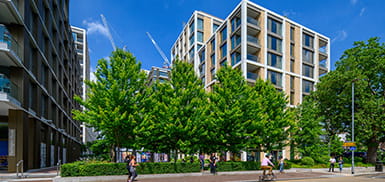Governance and Management
Our governance and management processes put our sustainability commitments at the centre of how we operate. They set out clear lines of responsibility, and detail sustainability actions and targets for each business function.
To operate as a successful and responsible business, understanding and addressing our sustainability risks and opportunities is crucial. Our key sustainability risks, and how we address each are also outlined below.
Governance
Ultimate responsibility for sustainability lies with the Berkeley Group plc Board, with involvement of our CEO and other senior management with responsibility for sustainability across all aspects of the business key to our success.
We have a dedicated sustainability team of more than 20 full-time professionals across the business. They work with our operational teams to embed sustainability across the organisation. We also have a network of champions throughout the business who promote sustainable practices and help us achieve our sustainability goals.
We believe that every one of our employees has a duty to integrate sustainability into their own role and working practices. This is reflected in Our Vision 2030 which is Berkeley Group's ambitious strategy for the future.
Through Our Vision 2030, sustainability topics are also included in the business objectives of the Board and all employees.
Berkeley Group plc Board
The Board of Berkeley Group plc takes ultimate responsibility for sustainability and for ensuring that sustainability targets are met. At each meeting (approximately bi-monthly) the Main Board is provided with a report on Our Vision and Sustainability, including progress against our targets.
Senior Leadership Team
Individual members of the Senior Leadership Team take responsibility for specific areas of sustainability, related to their background knowledge and expertise. They have oversight of their priority area, as well as providing senior level support for the development and launch of new initiatives.
Sustainability Team
Our Group sustainability team is responsible for setting the strategy for sustainability, ensuring compliance with legislation, and providing a framework for the operating companies to follow. They also provide support and guidance to the divisions, enabling them to meet the Group requirements. The team is led by the Group Head of Sustainability who reports directly to the Main Board through the Group Executive for Responsible Business.
Each of our operating companies has at least one dedicated sustainability practitioner. The divisional sustainability teams work closely with the project teams across all areas of the business, from land purchase through to customer service, providing training and guidance to staff, as well as supporting the implementation of local sustainability initiatives.
They are responsible for ensuring that Group policies and standards are met on every development. They undertake at least four formal assessments of each live construction site each year, to assess performance with our internal procedures, check regulatory and planning compliance and promote good practice. Higher risk sites, such as those with stringent environmental planning conditions, or in a sensitive setting, are visited more frequently.
Sustainability Champions
On our construction sites, a Site Manager or Project Manager takes overall responsibility for sustainability management on site, acting as a Site Sustainability Champion. They are responsible for monitoring progress towards any sustainability commitments that are relevant to their project and championing improvements in sustainability performance to achieve our targets.
All Staff
All staff have a role to play in delivering sustainability at Berkeley Group. Staff complete a mandatory e-learning module, introducing them to sustainability, as well as further training specific to their role, such as workshops and webinars. They receive regular communications on sustainability through a newsletter, which is distributed 3-4 times per year, as well as news items on sustainability initiatives posted on the staff intranet.
Contractors / Supply Chain
Our Standards for Contractors set out our requirements for our supply chain and provided to our contractors before they are awarded the contract. Once on site our contractors receive sustainability training as part of their induction, where we explain the requirements of the Berkeley Group Sustainability Standards. Site visits from the divisional sustainability teams ensure that the standards and other sustainability guidance are followed. Contractors are required to complete toolbox talks on sustainability aspects specific to their roles every month.
The Berkeley Group Sustainable Specification and Procurement Policy, in combination with the Sustainability Standards, ensure our supply chain understand their role in delivering sustainability. Our policy gives preference to procuring environmentally sustainable materials and services with consideration for ethics, labour rights, and social and environmental issues. It is a requirement for direct procurement, as well as procurement by contractors.
Management
Sustainability policies and standards are set at a Group level alongside our Sustainability Management System (SMS), and provide a framework for delivering our sustainability objectives. The standards outline our approach to managing sustainability issues relating to all business activities, from planning through to construction, marketing and handover. The SMS aims to ensure we understand and mitigate risks and disruptions to the environment and community caused by construction activities, including nuisance and pollution. It also provides the basis for a systematic and consistent approach to environmental management, to be delivered in conjunction with our contractors.
Our sustainability management system follows the principles of the ISO 14001 standard and ensures that our policies and standards are implemented across all our operating companies. Procedures and standards are regularly reviewed to ensure they are up to date to meet regulations as well as requirements set out by our internal policies. Our standards are also shared with our contractors prior to them commencing on site. Contractors are required to sign up to our Sustainability Standard for Contractors and provide evidence of how they can support Berkeley in achieving continuous improvements and best environmental management practices on site.
Our sustainability management system is managed and updated by our sustainability team. The team is also responsible for ensuring implementation of the procedures, providing any necessary training and undertaking reviews and audits.
These roles are explained in more detail below.
Sustainability Management Structure
Senior Leadership
Our Vision 2030 and Sustainability Board reviews sustainability progress on a monthly basis. These are attended by the Chief Executive, the Chief Financial Officer, the Chief Operating Officer, the Executive Committee member with responsibility for sustainability, the Group Executive for Responsible Business and the Group Head of Sustainability.
Sustainability Committee
The Berkeley Group Sustainability Committee meets bi-monthly, chaired by the Group Head of Sustainability and attended by the sustainability leads from across the business. It operates as a forum for sharing and reviewing performance data, as well as updating and upskilling the team on new initiatives. Cross-disciplinary working groups take action in specific areas, such as embodied carbon, guided by the Group Head of Sustainability.
Operational Sustainability Forum
Our Operational Sustainability Forum is attended by sustainability teams from across the divisions and provides an opportunity to discuss operational issues in more detail. The Forum allows us to share best practice, to discuss challenges and identify solutions. It supports a consistent approach to sustainability across our operating companies.
Sustainability Working Groups
Our Sustainability Working Groups bring together expertise from across the business to focus on a key sustainability theme or task. Through the working groups we develop Group-wide approaches, sharing knowledge on specific issues, such as Low Carbon Construction Sites, waste and nature. Members are drawn from the Group and divisional sustainability teams.
Risk
Understanding and addressing our sustainability risks and opportunities helps us to operate as a successful and responsible business. Our key sustainability risks, and how we address each, are outlined below.
Risks
| Risk | Financial Impact | Management Approach |
| Failure to address sustainability issues and the environmental and social impact of the homes and places we build. |
Reduced ability to acquire land, gain planning permission, manage sites effectively and respond to increasing customer demands for sustainable homes and communities, with access to green spaces and nature |
Strategic direction for sustainability at Group level and is embedded in Our Vision 2030. Specific commitments are in place to enhance environmental and social sustainability considerations in the operation of our business and the delivery of our homes and places. Operational procedures and processes are regularly reviewed to ensure that high standards and legal compliance are maintained. Dedicated sustainability teams are in place within the business and at Group level, providing advice, monitoring performance and driving improvement. |
| Homes and developments are not resilient to climate change. | Reputational damage; reduced likelihood of gaining planning permission for future homes. | Risk assessment undertaken on each development and climate change adaptation measures incorporated into the design, such as shading and ventilation strategies and nature based solutions to manage water. |
| Failure to match requirements of increasing standards in climate change and environmental policy and law, in performance and reporting requirements both at national and local level. | Reputational damage; reduced likelihood of gaining planning permission for future homes. |
We actively participate in government consultations relating to policy in this area; we review forthcoming legislation and assess the potential impact on our sites; we ensure our strategy in this area is ahead of regulation, putting us in a strong position to respond to future changes; we undertake regular reviews of our reporting procedures to ensure they respond to investor requirements. |
| Negative impact on local communities. | Reduced likelihood of gaining planning permission within the same area and poor reputation with potential customers; lack of integration with existing communities. | Consultation with the community early in the planning stages so they are informed about the development. Regular site sustainability assessments undertaken. All sites register with the Considerate Constructors Scheme. Early provision of amenities which benefit the wider community. |
| Poor site management leads to environmental incidents and/or sustainability impacts. | Reputational damage and fines. | Regular site sustainability assessments are undertaken. Our sustainability management system (SMS) sets out our requirements for sites including procedures and guidance. Communication of sustainability requirements to all contractors. |
| Failure to improve the efficiency and embodied impacts of the homes we build. | Reduced likelihood of gaining planning approval in future. Reduced market value of homes which do not meet customer expectations. | Our Scope 3 science-based target commits us to building more efficient homes and working with our supply chain to reduce the embodied carbon within the materials and services we procure. |
| Increased frequency of extreme weather events such as flooding, water shortages and high winds disrupts the construction programme. | Delays to the build programme. |
Physical climate risks such as flooding are assessed pre-acquisition for all sites and subsequently during development risks are monitored further if the area falls in an at risk zone. Our homes are designed by specialist teams that select appropriate materials and fixing details which can withstand local conditions. |
| Disruption to the supply of materials or services due to extreme weather events and/ or responses to climate change such as carbon pricing. | Costs of finding alternative suppliers and/ or delays to the build programme. | Working with our supply chain to better understand the source of raw materials and location of processing and manufacturing activities. |
Opportunities
| Opportunity | Financial Impact | Management Approach / Our Response |
| Designing and building our homes to be more energy efficient and adapted to a changing climate. | Increased market value of homes due to reduced running costs and increased comfort for residents. | Our Scope 3 science-based target commits us to building more efficient homes; overheating and flooding risk assessments are undertaken on each development and climate change adaptation measures incorporated into the design. |
| Demonstrating a strong strategy and performance in climate change can help us to support local planning authorities in addressing the climate emergency. | Ability to acquire land and obtain planning permission. | Climate action is incorporated within our business strategy, Our Vision 2030, highlighting its strategic importance within our business. |
| Focusing on large-scale brownfield regeneration has a positive impact on society and the environment. | Local communities and stakeholders are more likely to partner with a developer with strong sustainability credentials. | Climate Action, Community and Nature are incorporated into our business strategy, Our Vision 2030. |
| Increased energy efficiency in our operations. | Lower operating costs and reduced vulnerability to fluctuating prices due to efficiencies and lower waste disposal costs. | Targeted reduction of emissions across all of our activities through science-based targets (SBTs); regular monitoring of progress and annual reporting. |
| Working with our supply chain to improve material efficiency and reduce waste. | Lower costs through increased material efficiency and reduced waste. | Targeted reduction of emissions across all of our activities through science-based targets (SBTs). Implementing our waste strategy which focuses on the key waste streams. |

Sustainability Reports and Disclosures
Key sustainability documents published by the Berkeley Group, including carbon and climate change disclosures.

